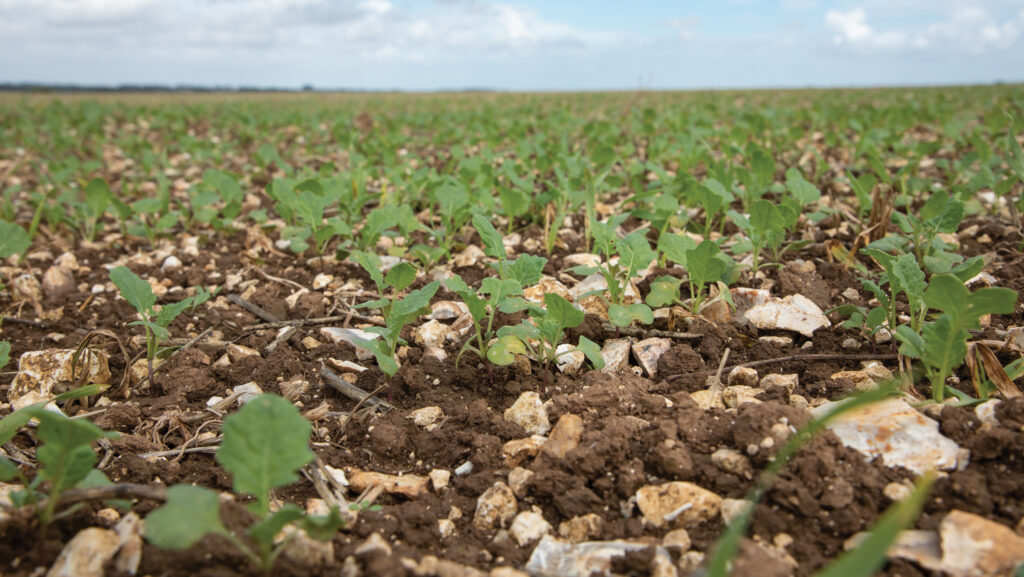OSR plantings at 40-year low as sector looks for solutions
 © GNP
© GNP The viable UK rapeseed area for 2024-25 is forecast to be the smallest in the past four decades, with industry estimates pegging it at 215,000ha ahead of next year’s harvest.
Farmers’ co-operative United Oilseeds suggests this would leave the UK with a domestic crop of about 663,850t in 2025 – well below even the hard-hit 2024 crop of 833,900t.
Demand for oilseeds remains high and prices have rallied in recent weeks, with delivered oilseed rape (OSR) trading at between £420/t and £450/t in mid-November.
See also: United Oilseeds maintains profits despite tough year for crop
The numbers
- 833,900 tonnes UK oilseeds production forecast 2024-25
- 1.9m tonnes UK oilseeds annual domestic consumption
- 36% Fall in planted rapeseed area year-on-year
Oil quality bonuses for the 2024 crop were up at the second highest levels on record, which helped to return an additional £6/t margin for growers on the year.
Despite firmer prices this autumn, cabbage stem flea beetle pressure on plantings in previous years and dwindling yields have left some farm businesses wary of growing the crop.
United Oilseeds managing director James Warner said yields collected from its growers were down by 8% for harvest 2024 across the UK at 2.9t/ha, having previously averaged about 3.5t/ha during the 2010s.
“While it’s disappointing that yields and tonnages are falling, I remain positive about the future for OSR in the UK.”
He added that the crop had also seen a lot of competition in the past year from Sustainable Farming Incentive (SFI) initiatives, with industry figures suggesting that about 8% of UK productive land had gone into SFI.
A record import volume of 1.26m tonnes will be required to satisfy demand, with a domestic consumption of 1.9m tonnes expected.
Mr Warner said the impact of a 2m-tonne swing in net trade of oilseeds in the past decade equates to roughly a £1bn loss in UK trade.
In terms of self-sufficiency, UK rapeseed accounted for 40% of the edible oils market share in 2016-17, but this figure is expected to fall to just 14% by 2025-26.
A smaller domestic crop also risks creating challenges in terms of future industry investment into plant protection products, seed breeding, and crushers in the UK.
Seed use
Seed sales have reportedly dropped by 36% across the oilseeds sector this autumn.
Hybrid plantings have fallen from just shy of 200,000ha in 2023 to 122,358ha in 2024, meanwhile conventional varieties have dropped by 43% to just 26,000ha.
Mr Warner said: “Hybrids make up about 55% of the market, with conventional now only accounting for 13% – that swing from conventional into hybrids has really continued.
“It’s the previous poor outcomes from a number of factors that have had a combined impact over recent years, including weather patterns, pest pressure and some establishment setbacks.”
Farm-saved seed plantings are also forecast to be down, with estimates indicating a 60% drop to 11,000ha.
But crop establishment has improved slightly, with losses estimated at 4% so far this year compared to 10% this time last year.
OSR reboot
United Oilseeds, along with 40 industry partners, have collaborated on a project to revitalise the UK oilseeds sector and combat some of the challenges affecting the crop.
One of these initiatives has been the installation of a network of magic traps across key areas to monitor flea beetle numbers.
Oilseeds industry expert Dr Julian Little said that the crop was important as a pollen and nectar source for bees in the spring.
He added that the reboot had been split into three key areas of agronomy, policy, and breeding, and it was about achieving a mixture of quick wins and longer-term solutions.
One sticking point remains the unlevel playing field with growers competing in the UK market with imports that are often grown using neonicotinoids, despite these products being banned for UK farmers.
However, Dr Little said the reboot was not asking for neonicotinoids to come back.
An exciting proposition being discussed as part of the reboot with the government was the potential for future Sustainable Farming Incentive payments related to growing oilseed rape, due to its flowering benefits.
